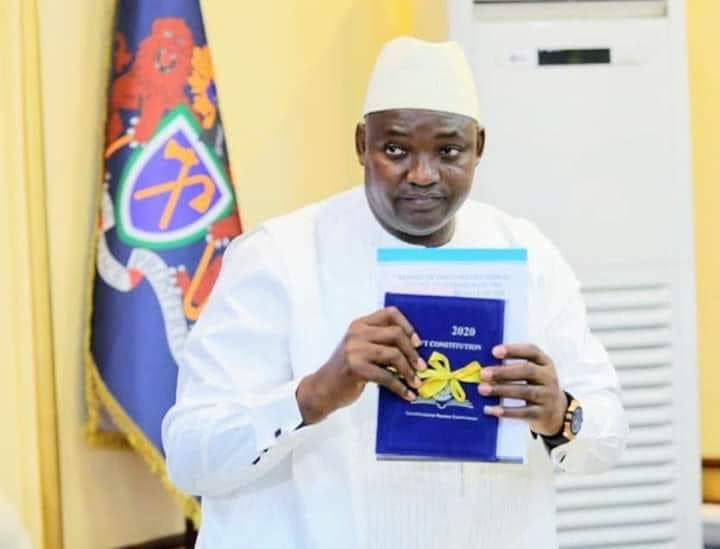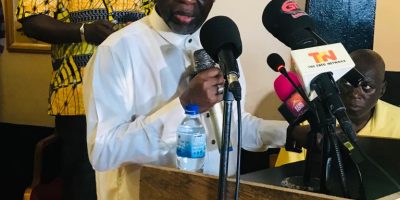 by Alagi Yorro Jallow.
by Alagi Yorro Jallow.
Part 1
It is fair to say the Constitutional Review Commission (CRC) has exhibited remarkable drafting skills to create a seminal People’s Centered Constitution that may transform The Gambia into a fully functioning democracy if adjudication and administration of law are not politicized.
Will the new Constitution attain popular endorsement or whether politics would kill it. The Gambia come from a tradition where what is lawful is often by way of an edict, or where fidelity to “words” brings quick convenience rather than asking the true intention of the drafters of the homegrown Constitution in specific instances precisely defined.
Why has the symbolism and the spirit of a new constitutional not permeated parts of ordinary society not concerned with the technicalities of law or the legal industry? Why is the new Constitution seen by many as merely a document for the society’s elite and the political class?
In the same manner, Gambians must be resolved in our efforts to ensure that any provisions which expressly deny the exercise of fundamental rights guaranteed by the People’s Centered legal instrument, the supreme law of the land, are reviewed in the furtherance of our democratic society. A constitution built upon political impartiality is the one to attain popular endorsement.
Reading from the past, three ingredients are always present in situations where a sitting President wants to prolong his stay in power beyond that which is prescribed by law. Consolidation of power by aligning with significant political interests. Efforts to align with significant political factions and main interests of the elite within the State, so that opposition to such move is diminished. Those who have tried to stay on, without the backing of the military or main interests in their countries have failed.
For instance, President Fredrick Chiluba (Zambia) and Bakili Muluzi (Malawi) in 2001 and 2003 respectively and President Olusegun Obasanjo, whose attempt at a third term was rejected by Nigeria’s senate in 2006. In Zimbabwe, Rwanda, Burundi, and Uganda, President Robert Mugabe, President Paul Kagame, President Pierre Nkuruzinza and President Yoweri Museveni respectively have been able to prolong their terms in office because they are the figureheads of the ruling military elite, for whom preserving the Presidency also means that interests, control, and exploitation of the State by senior military henchmen are not diminished.
The Gambia’s Constitutional Review Commission(CRC) Act was assented to by the President on 11 January 2018 and published in the Gazette on 24 January 2018. The CRC Act was first introduced as a Bill in the National Assembly on 11 December 2017. It has the mandate for a new homegrown Constitution to replace the 1997 Second Republican Constitution to pave a new era in governance to the Gambia’s Third Republic, the Gambia be governed by a Third Republican Constitution. Moreover, many Gambians were filled with a sense of deep jubilation, hoping for a new constitution heralding the beginning of a new dawn breaking from the past. The People’s Centered Constitution is supposed to usher the Gambia into an epoch of constitutional supremacy, where the powers of State actors, including that of Parliament, cedes to the requirements of the supreme law. Unfortunately, State actors only embraced the letter of the new supreme law, but not the spirit.
Any keen political science and law student of The Gambia’s political History should know that the Constitution is seeking to cure the historical centrist, executive supreme, and often dictatorial dispensation that had ailed the post-colonial Gambia.
The People’s Centered Constitution has never been embraced for its spirit. Those tasked with its implementation have worked so hard to roll back the gains made. A sample of this rollback includes the erosion of the Presidential term limit attempts to scrap Section 100 ( 2) section 5 of Schedule 3 in the new Constitution that it is “retroactively discriminatory” according to President Adama Barrow’s cronies in its effect, if passed in the referendum, will bar President Barrow from contesting elections after 2021. Therefore, the government encourages the CRC to delete section 5 of Schedule 3 and further qualify the provisions of section 100(2) by making it effective from the coming into force of the draft constitution to avoid any ambiguities.”
The Constitutional Review Commission (CRC) had said it was the general sentiment of the majority of Gambians during their consultations.
The thought of entertaining politics to influence over law seems unscrupulous because politics generate apprehension that may do unrecognizable injustices. For this reason, the law must stay off politics to achieve justice and fairness for the public interest.
According to Section 5 of Schedule 3a person duly elected President of The Gambia before the effective date and serving in office as at the effective date of the new Constitution, shall be the first president of the third republic and shall continue to hold the Office of President following the provisions of the Constitution.
The desire to change the Constitution in order to rework the structure of the executive. There will be the desire to change or amend the Constitution to redefine presidential terms limits or to abolish altogether. In countries where the populace may not be too receptive to a President seeking to overstay his welcome, creative ways are found, through restructuring the executive, by way of constitutional review.
This is to ensure that the “exiting” President somehow retains some influential role in a different capacity. In 2008, when Vladamir Putin was constitutionally barred from serving a third term as Russia’s President, he became Prime Minister under President Medvedev.
Even as Prime Minister, Putin wielded more power than the President. He again later assumed the role of President, following elections in 2012, with Medvedev becoming Prime Minister. In a switch of positions that birthed the political neology, “tandemocracy.”
Putin is scheduled to step down in 2024…..but constitutionally he is currently “re-organizing” government and looking at amending the Constitution to give Russia’s Parliament more power. It is assumed that Putin is preparing the way to influence the affairs of government in another capacity post-2024.
The use of extra-legal means to achieve political goals to remain in power will always find opposition to a section of society. No effort is spared mute dissenting voices. In a period of transition, remaining in power is a goal that must be achieved expeditiously—sticking to the Rule of Law often seen as a stumbling block. Thus, there will be a tendency to pursue political goals using extra-legal means.
Such expediency brings with it the misuse of the State’s monopoly of violence for intimidation and, in some instances, the cause of actual harm. To chronic dissenters, the prosecutorial power of the State is deployed against them. Freedom of expression and conscience, especially as against the continuity of such persons in power, is heavily curtailed.
In places like Burundi, Rwanda, Uganda, and Russia, repression is often at its peak, when the respective sitting President is working on legitimizing their stay in power. A lot has been achieved since, including final drafting a new constitution of the governance structure to include dispersing power from the centralized State to regionals. The final draft constitution became the supreme law and injected two new fundamental ethos into Gambia’s constitutional dispensation.
One, the principle that all sovereign power belongs to the people and that such power may be exercised directly or via delegated representation. Such power is also donated to organs of the State, including the legislature, the executive, and the judiciary. Two, the supremacy of the Constitution binds all persons and state organs, and nobody can exercise State authority outside the bounds set by the Constitution.
Will history repeat itself?
“History doesn’t repeat itself, but it often rhymes.” A Constitution Built On Political Impartiality Accomplish Popular Endorsement




Ma sha Allah great and thanks for sharing